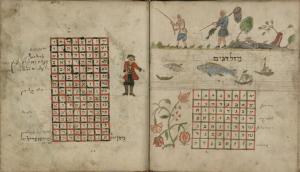This is an archive of prayers and songs written for, or relevant to, Rosh Ḥodesh Adar, the 12th (and in leap years also the 13th) month in the Jewish calendar. On leap years, the 12th month is known as אדר א׳ “Adar Alef” and the 13th month as אדר ב׳ “Adar Bet”. Click here to contribute a public reading you have written or selected for Rosh Ḥodesh Adar. Filter resources by Collaborator Name Filter resources by Tag Filter resources by Category Filter resources by Language Filter resources by Date Range
To the best of my ability, this is a faithful transcription of the תְּחִנָה לְשַׁבָּת מְבָרְכִים רֹאשׁ חוֺדֶשׁ אַדָר (“Tkhine for Shabbat Mevorkhim Rosh Ḥodesh Adar [II]”) which appeared in תחנות מקרא קודש (Teḥinot Miqra Qodesh, Widow and Brothers Romm, Vilna 1877). English translation adapted slightly from Techinas: A Voice from the Heart “As Only A Woman Can Pray” by Rivka Zakutinsky (Aura Press, 1992). –A.N. Varady . . . Categories: Tags: 19th century C.E., 57th century A.M., Bilhah, Haman, Mazal Dagim, Mordekhai, Naphtali, Needing Transcription, new moon, paraliturgical birkat haḥodesh, paraliturgical teḥinot, Pisces, Queen Esther, שבת מבורכים shabbat mevorkhim, תחינות teḥinot, תחינות tkhines, Yiddish vernacular prayer Contributor(s): To the best of my ability, this is a faithful transcription of the תְּחִנָה לְשַׁבָּת מְבָרְכִים רֹאשׁ חוֺדֶשׁ אַדָר רִאשׁוֹן (“Tkhine for Shabbat Mevorkhim Rosh Ḥodesh Adar I”) which appeared in תחנות מקרא קודש (Teḥinot Miqra Qodesh, Widow and Brothers Romm, Vilna 1877). English translation adapted slightly from Techinas: A Voice from the Heart “As Only A Woman Can Pray” by Rivka Zakutinsky (Aura Press, 1992). –A.N. Varady . . . Categories: Tags: 19th century C.E., 57th century A.M., Bilhah, In the merit of Moshe Rabbeinu, Mazal Dagim, Naphtali, new moon, paraliturgical birkat haḥodesh, paraliturgical teḥinot, Pisces, שבת מבורכים shabbat mevorkhim, תחינות teḥinot, תחינות tkhines, Yiddish vernacular prayer Contributor(s): Y.L. Peretz rejected cultural universalism, seeing the world as composed of different nations, each with its own character. Liptzin comments that “Every people is seen by him as a chosen people…”; he saw his role as a Jewish writer to express “Jewish ideals…grounded in Jewish tradition and Jewish history.” This is Peretz’s lampoon of the popularity of Friedrich Schiller’s idealistic paean made famous as the lyrics to the climax of Beethoven’s Ninth Symphony. . . . Categories: Tags: Contributor(s): |



